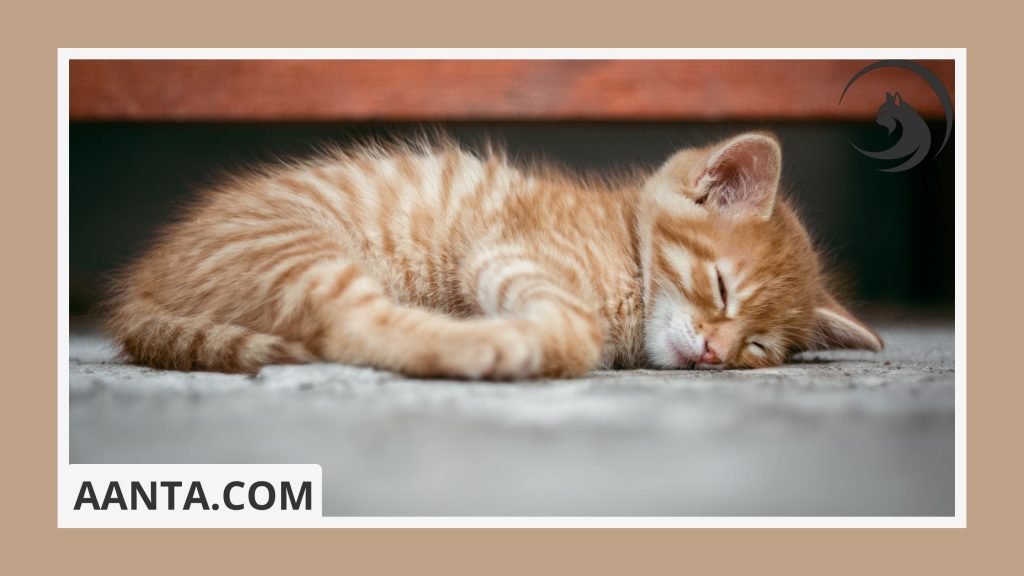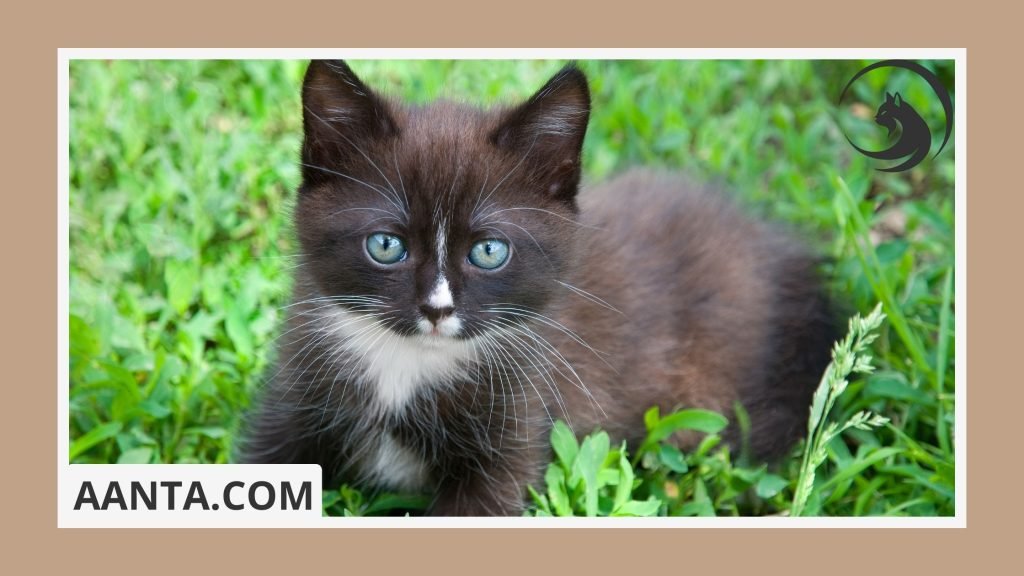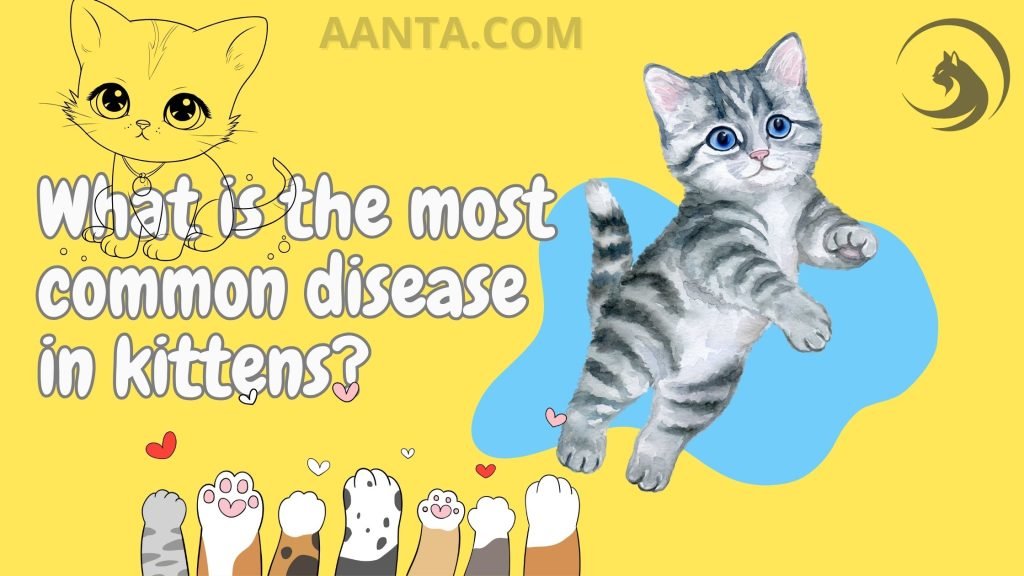Kittens, those tiny balls of fur that melt hearts with their playful antics and adorable mews, are undoubtedly delightful additions to any household. However, along with their boundless energy and curiosity, kittens are also prone to various health issues. Just like babies, they can fall prey to a range of diseases that, if left untreated, can jeopardize their well-being. In this article, we’ll explore the most common diseases afflicting kittens, from respiratory infections to parasitic infestations, and the symptoms, treatments, and preventive measures that every cat owner should be aware of. Understanding these health concerns is vital for ensuring the longevity and happiness of our beloved feline companions. So, let’s embark on a journey to unravel the mysteries of kitten health and arm ourselves with the knowledge needed to keep these tiny bundles of joy thriving.
Understanding Common Diseases in Kittens

Kittens, with their developing immune systems and fragile bodies, are particularly susceptible to a variety of diseases. Understanding the common health issues that affect them is crucial for providing timely care and intervention. Genetics, environmental conditions, and maternal health can all influence a kitten’s susceptibility to certain diseases.
One of the most significant contributors to kitten health issues is their undeveloped immune system. Kittens rely heavily on antibodies passed from their mother’s milk during the first few weeks of life. However, this protection wanes over time, leaving them vulnerable to infections and diseases until their immune systems mature.
Environmental factors also play a significant role in the health of kittens. Poor sanitation, overcrowding, and exposure to infectious agents can all increase the risk of disease transmission. Additionally, stressors such as changes in routine or introduction to new environments can weaken a kitten’s immune response, making them more susceptible to illness.
By understanding these factors and their impact on kitten health, pet owners can take proactive measures to minimize risks and ensure the well-being of their furry companions. Regular veterinary check-ups, vaccination protocols, and proper nutrition are essential to maintaining a healthy kitten. In the following sections, we will explore some of the most common diseases that afflict kittens and discuss their symptoms, treatments, and preventive measures in detail.
Respiratory Infections

Respiratory infections are a frequent occurrence in kittens, particularly those living in multi-cat environments or shelters. These infections are often caused by viruses or bacteria and can spread rapidly among susceptible individuals. Kittens, with their developing immune systems, are especially vulnerable to respiratory illnesses.
Symptoms:
- Sneezing and coughing: Kittens with respiratory infections often exhibit frequent sneezing and occasional coughing. These symptoms may be accompanied by nasal discharge, which can range from clear to thick and mucus-like.
- Nasal discharge: A runny nose is a common sign of respiratory infection in kittens. The discharge may be clear initially but can become thicker and yellowish-green as the infection progresses.
- Lethargy: Sick kittens may appear lethargic and less interested in playing or exploring their surroundings. They may spend more time sleeping and show a general lack of energy.
Treatment:
- Antibiotics: In cases of bacterial respiratory infections, antibiotics may be prescribed to help combat the infection. It’s essential to administer antibiotics as directed by a veterinarian and to complete the full course of treatment, even if symptoms improve.
- Supportive care: Providing supportive care is crucial for helping kittens recover from respiratory infections. This may include keeping them warm and comfortable, ensuring they remain hydrated, and offering nutritious food.
- Humidification: Increasing humidity in the environment, such as using a humidifier or placing the kitten in a steamy bathroom, can help alleviate nasal congestion and make breathing easier.
Prevention:
- Vaccination: Vaccination is one of the most effective ways to prevent respiratory infections in kittens. Vaccines against common pathogens, such as feline herpesvirus and calicivirus, are often included in the core vaccination series recommended for kittens.
- Isolation: When introducing a new kitten into a household with existing cats, it’s essential to isolate the newcomer initially to prevent the spread of infectious diseases. This allows for observation and ensures that the new kitten is healthy before introducing it to other cats.
- Hygiene practices: Practicing good hygiene, such as regularly cleaning litter boxes and bedding, can help reduce the risk of respiratory infections by minimizing exposure to infectious agents.
By recognizing the symptoms of respiratory infections, seeking prompt veterinary care, and implementing preventive measures, cat owners can help protect their kittens from these common and often contagious illnesses. Providing a nurturing environment and proper medical attention are key to helping sick kittens recover and thrive.
Parasitic Infections

Parasitic infections are common in kittens and can have a significant impact on their health if left untreated. Kittens are particularly susceptible to parasites due to their immature immune systems and behaviors such as mouthing and grooming, which increase their exposure to infectious agents. Understanding the types of parasites that can affect kittens and recognizing the signs of infestation is essential for effective prevention and treatment.
Types of Parasites:
- Fleas: Fleas are external parasites that feed on the blood of their hosts, causing irritation, itching, and potential allergic reactions in kittens. Flea infestations can lead to skin infections and transmit diseases such as Bartonella (cat scratch fever).
- Ticks: Ticks are another common external parasite that can attach to a kitten’s skin and feed on their blood. In addition to causing irritation and discomfort, ticks can transmit serious diseases such as Lyme disease and ehrlichiosis.
- Intestinal Worms: Intestinal worms such as roundworms, hookworms, and tapeworms are internal parasites that can infect kittens through ingestion of contaminated soil, water, or prey. These worms can cause symptoms such as diarrhea, vomiting, weight loss, and a potbellied appearance in kittens.
- Ear Mites: Ear mites are tiny parasites that live in the ear canal and feed on the wax and oils produced by the skin. Infestations can cause intense itching, head shaking, and ear discharge in affected kittens.
Symptoms of Parasitic Infections:
- Scratching or biting: Kittens may exhibit increased scratching, biting, or licking of their fur in response to the irritation caused by flea or tick infestations.
- Visible parasites: In cases of severe infestation, fleas, ticks, or worms may be visible on the kitten’s fur, skin, or feces.
- Changes in appetite or weight loss: Intestinal parasites can cause digestive disturbances, leading to changes in appetite, weight loss, and poor growth in kittens.
- Ear discharge or odor: Kittens with ear mite infestations may have dark, waxy discharge in their ears and emit a foul odor.
Treatment and Prevention:
- Topical treatments: Flea and tick preventives applied to the skin are effective at preventing infestations and killing existing parasites. These treatments should be administered according to the manufacturer’s instructions and under veterinary guidance.
- Deworming medications: Deworming medications are used to treat intestinal parasite infections in kittens. These medications may need to be administered multiple times to ensure all parasites are eliminated.
- Regular grooming: Regular grooming with a flea comb can help remove fleas, ticks, and flea dirt from a kitten’s fur, reducing the risk of infestation.
- Environmental control: Thoroughly cleaning and vacuuming the kitten’s environment can help eliminate flea eggs, larvae, and pupae, reducing the likelihood of re-infestation.
- Preventive medications: In areas where parasitic infections are common, veterinarians may recommend preventive medications to protect kittens from fleas, ticks, and other parasites.
By practicing good hygiene, administering preventive medications, and seeking prompt veterinary care at the first sign of infestation, cat owners can protect their kittens from the harmful effects of parasitic infections and ensure their continued health and well-being.
Feline Panleukopenia (Feline Distemper)

Feline Panleukopenia, commonly referred to as Feline Distemper, is a highly contagious viral disease that primarily affects kittens and unvaccinated cats. This disease is caused by the feline parvovirus, which is incredibly resilient and can survive in the environment for months, posing a significant risk to susceptible animals.
Symptoms
- Fever: Feline Panleukopenia often manifests with a high fever, which may cause lethargy and decreased appetite in affected kittens.
- Vomiting and diarrhea: Kittens with Feline Distemper may experience severe vomiting and diarrhea, leading to dehydration and electrolyte imbalances. The diarrhea may be bloody and have a foul odor.
- Weakness and lethargy: Affected kittens may become increasingly weak and lethargic as the disease progresses, exhibiting a reluctance to move or play.
- Dehydration: Due to vomiting and diarrhea, kittens with Feline Distemper are at high risk of dehydration. Signs of dehydration include sunken eyes, dry gums, and decreased skin elasticity.
Transmission:
Feline Panleukopenia is highly contagious and can spread through direct contact with infected cats or contaminated environments. The virus can survive in the environment for extended periods, making it easy for susceptible kittens to contract the disease by coming into contact with contaminated surfaces or objects.
Prevention:
- Vaccination: Vaccination is the most effective means of preventing Feline Panleukopenia. The core vaccination series for kittens typically includes a vaccine against this disease, administered in multiple doses starting at around eight weeks of age.
- Isolation of sick cats: If a kitten is suspected or confirmed to have Feline Distemper, it’s crucial to isolate them from other cats to prevent the spread of the virus. Disinfecting contaminated areas and objects is also essential to eliminate the virus from the environment.
- Routine disinfection: Regularly disinfecting surfaces, litter boxes, bedding, and other items with a bleach solution can help reduce the risk of Feline Panleukopenia transmission.
Treatment:
- Supportive care: There is no specific antiviral treatment for Feline Distemper, so supportive care is the mainstay of treatment. This includes providing fluids, electrolyte supplementation, and nutritional support to maintain hydration and strength.
- Symptomatic treatment: Medications may be prescribed to alleviate symptoms such as vomiting and diarrhea. Anti-nausea medications and fluids administered intravenously or subcutaneously may be necessary to manage dehydration.
Feline Panleukopenia is a serious and potentially fatal disease, especially in young kittens. However, with timely vaccination, proper hygiene practices, and prompt veterinary care, the risk of Feline Distemper can be significantly reduced, allowing kittens to lead healthy and fulfilling lives.
Feline Leukemia Virus (FeLV)

Feline Leukemia Virus (FeLV) is a retrovirus that poses a significant health threat to cats, particularly kittens, worldwide. This contagious virus attacks a kitten’s immune system, compromising its ability to defend against infections, and leaving them vulnerable to a range of diseases, including anemia and certain types of cancer. FeLV is primarily transmitted through close contact with infected cats, such as grooming or sharing food and water bowls. Kittens infected with FeLV may exhibit a variety of symptoms, including weakness, lethargy, loss of appetite, recurrent infections, and even developmental abnormalities.
Preventing FeLV transmission is paramount to protecting kittens from this potentially life-threatening virus. Vaccination is a crucial preventive measure, with the FeLV vaccine being routinely administered as part of a kitten’s core vaccination series. Limiting exposure to infected cats, especially in multi-cat households or environments where stray cats are present, can help reduce the risk of transmission. Additionally, routine testing for FeLV is recommended for all newly adopted kittens to identify and isolate infected individuals promptly.
Once diagnosed with FeLV, affected kittens require ongoing veterinary care to manage symptoms and maintain their quality of life. This may include treatment for infections, supportive care, and monitoring for any complications associated with FeLV. Providing a nurturing indoor environment, free from stressors and potential sources of infection, is essential for the well-being of FeLV-positive kittens.
While FeLV poses challenges to kitten health, proactive measures and vigilant monitoring can significantly improve their prognosis. By implementing preventive measures, including vaccination and routine testing, and providing compassionate care for affected kittens, cat owners can help mitigate the impact of FeLV and ensure the best possible outcome for their furry companions.
Nutritional Considerations
Ensuring proper nutrition is essential for the health and well-being of kittens, as it plays a crucial role in supporting their growth, development, and immune system function. Providing a balanced diet that meets their specific nutritional needs is key to promoting optimal health and preventing common health issues. Here are some important nutritional considerations for kittens:
1. High-Quality Kitten Food:
Kittens have unique dietary requirements that differ from adult cats. They need a diet that is rich in protein, essential fatty acids, vitamins, and minerals to support their rapid growth and development. Choose a high-quality commercial kitten food formulated specifically for their nutritional needs.
2. Protein-Rich Diet:
The essential thing is Protein for building and repairing tissues, supporting muscle development, and maintaining a healthy immune system. Ensure that the kitten food you choose contains high-quality sources of protein, such as meat, poultry, or fish.
3. Adequate Hydration:
Proper hydration is crucial for kittens’ overall health and well-being. Always provide fresh, clean water for your kitten to drink. Wet kitten food can also contribute to their hydration needs, as it has a higher moisture content than dry food.
4. Controlled Feeding Portions:
It’s important to feed kittens appropriate portion sizes to prevent overfeeding or underfeeding. Follow the feeding guidelines provided on the kitten food packaging, and adjust portion sizes based on your kitten’s age, weight, and activity level.
5. Essential Nutrients:
Kittens require specific nutrients, such as taurine, omega-3 fatty acids, and calcium, for optimal growth and development. Choose kitten food that is fortified with these essential nutrients to ensure they receive all the nutrients they need.
6. Gradual Transition:
When introducing new foods or transitioning between kitten food formulas, do so gradually to avoid gastrointestinal upset. Gradually mix increasing amounts of the new food with decreasing amounts of the old food over several days until the transition is complete.
By paying close attention to your kitten’s nutritional needs and providing them with a balanced diet, you can help support their growth, development, and overall health. Nutritional considerations are an essential aspect of kitten care and can contribute to their long-term well-being.
Conclusion
In conclusion, being aware of the most common diseases in kittens is crucial for providing them with the best possible care. Respiratory infections, Feline Panleukopenia, parasitic infections, and Feline Leukemia Virus (FeLV) are just a few examples of the health challenges kittens may face. By understanding the symptoms, treatments, and preventive measures discussed in this article, cat owners can take proactive steps to protect their furry companions. Providing a balanced diet, routine veterinary care, and a safe indoor environment are essential for ensuring the health and well-being of kittens. With proper care and attention, kittens can grow into healthy, happy adult cats and bring joy to their families for years to come.
FAQs
- How can I tell if my kitten is sick?
- Watch for signs like lethargy, changes in appetite or litter box habits, vomiting, diarrhea, or respiratory symptoms. If you notice any concerning symptoms, consult your veterinarian.
- At what age should kittens start vaccinations?
- Kittens typically start their vaccination series around 6-8 weeks of age, with boosters given every 3-4 weeks until they are around 16 weeks old.
- Can I prevent parasitic infections in my kitten?
- Regular preventive treatments, such as deworming and flea prevention, can significantly reduce the risk of parasitic infections. Consult your veterinarian for the best prevention plan for your kitten.
- What should I do if my kitten stops eating?
- Loss of appetite can be a sign of illness and should be taken seriously, especially in kittens. If your kitten refuses to eat for more than 24 hours, seek veterinary attention promptly.
- How can I create a kitten-friendly environment at home?
- Provide plenty of toys for stimulation, a variety of perches and hiding spots, and ensure access to clean water and litter boxes. Minimize stressors like loud noises or abrupt changes in routine.
By addressing these FAQs and implementing the advice provided in the conclusion, cat owners can ensure the health and happiness of their kittens throughout their lives.







